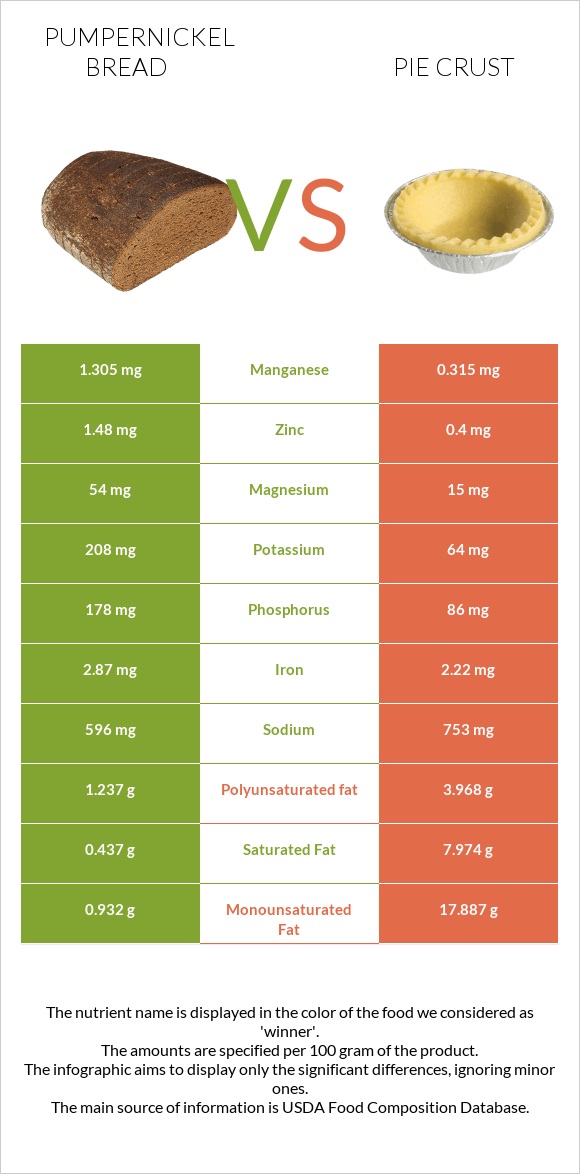Pumpernickel bread vs. Pie crust — In-Depth Nutrition Comparison
Compare
What are the main differences between pumpernickel bread and pie crust?
- Pumpernickel bread is richer in manganese, copper, phosphorus, zinc, magnesium, iron, and vitamin B2, yet pie crust is richer in vitamin B1.
- Pumpernickel bread's daily need coverage for manganese is 43% higher.
- Pumpernickel bread has 4 times more copper than pie crust. Pumpernickel bread has 0.287mg of copper, while pie crust has 0.075mg.
- Pumpernickel bread contains less sodium.
We used Bread, pumpernickel and Pie crust, standard-type, dry mix types in this comparison.
Infographic

Infographic link
Mineral Comparison
Mineral comparison score is based on the number of minerals by which one or the other food is richer. The "coverage" charts below show how much of the daily needs can be covered by 300 grams of the food.
| Contains more MagnesiumMagnesium | +260% |
| Contains more CalciumCalcium | +11.5% |
| Contains more PotassiumPotassium | +225% |
| Contains more IronIron | +29.3% |
| Contains more CopperCopper | +282.7% |
| Contains more ZincZinc | +270% |
| Contains more PhosphorusPhosphorus | +107% |
| Contains less SodiumSodium | -20.8% |
| Contains more ManganeseManganese | +314.3% |
Vitamin Comparison
Vitamin comparison score is based on the number of vitamins by which one or the other food is richer. The "coverage" charts below show how much of the daily needs can be covered by 300 grams of the food.
| Contains more Vitamin EVitamin E | +∞% |
| Contains more Vitamin B2Vitamin B2 | +43.2% |
| Contains more Vitamin B3Vitamin B3 | +13.3% |
| Contains more Vitamin B5Vitamin B5 | +50.7% |
| Contains more Vitamin B6Vitamin B6 | +96.9% |
| Contains more Vitamin KVitamin K | +∞% |
| Contains more Vitamin B1Vitamin B1 | +19.9% |
| Contains more FolateFolate | +11.8% |
All nutrients comparison - raw data values
| Nutrient |  |
 |
DV% diff. |
| Fats | 3.1g | 31.4g | 44% |
| Manganese | 1.305mg | 0.315mg | 43% |
| Monounsaturated fat | 0.932g | 17.887g | 42% |
| Saturated fat | 0.437g | 7.974g | 34% |
| Fiber | 6.5g | 26% | |
| Copper | 0.287mg | 0.075mg | 24% |
| Polyunsaturated fat | 1.237g | 3.968g | 18% |
| Calories | 250kcal | 518kcal | 13% |
| Phosphorus | 178mg | 86mg | 13% |
| Zinc | 1.48mg | 0.4mg | 10% |
| Magnesium | 54mg | 15mg | 9% |
| Iron | 2.87mg | 2.22mg | 8% |
| Sodium | 596mg | 753mg | 7% |
| Vitamin B2 | 0.305mg | 0.213mg | 7% |
| Vitamin B1 | 0.327mg | 0.392mg | 5% |
| Vitamin B6 | 0.126mg | 0.064mg | 5% |
| Protein | 8.7g | 6.9g | 4% |
| Potassium | 208mg | 64mg | 4% |
| Vitamin E | 0.42mg | 3% | |
| Selenium | 24.5µg | 22.9µg | 3% |
| Vitamin B5 | 0.404mg | 0.268mg | 3% |
| Folate | 93µg | 104µg | 3% |
| Choline | 14.6mg | 3% | |
| Carbs | 47.5g | 52.1g | 2% |
| Vitamin B3 | 3.091mg | 2.727mg | 2% |
| Calcium | 68mg | 61mg | 1% |
| Vitamin K | 0.8µg | 1% | |
| Net carbs | 41g | 52.1g | N/A |
| Sugar | 0.53g | N/A | |
| Tryptophan | 0.097mg | 0.08mg | 0% |
| Threonine | 0.267mg | 0.184mg | 0% |
| Isoleucine | 0.334mg | 0.255mg | 0% |
| Leucine | 0.602mg | 0.476mg | 0% |
| Lysine | 0.248mg | 0.133mg | 0% |
| Methionine | 0.155mg | 0.121mg | 0% |
| Phenylalanine | 0.422mg | 0.339mg | 0% |
| Valine | 0.396mg | 0.289mg | 0% |
| Histidine | 0.196mg | 0.146mg | 0% |
Macronutrient Comparison
Macronutrient breakdown side-by-side comparison
Protein:
8.7 g
Fats:
3.1 g
Carbs:
47.5 g
Water:
37.9 g
Other:
2.8 g
Protein:
6.9 g
Fats:
31.4 g
Carbs:
52.1 g
Water:
7.6 g
Other:
2 g
| Contains more ProteinProtein | +26.1% |
| Contains more WaterWater | +398.7% |
| Contains more OtherOther | +40% |
| Contains more FatsFats | +912.9% |
~equal in
Carbs
~52.1g
Fat Type Comparison
Fat type breakdown side-by-side comparison
Saturated fat:
Sat. Fat
0.437 g
Monounsaturated fat:
Mono. Fat
0.932 g
Polyunsaturated fat:
Poly. Fat
1.237 g
Saturated fat:
Sat. Fat
7.974 g
Monounsaturated fat:
Mono. Fat
17.887 g
Polyunsaturated fat:
Poly. Fat
3.968 g
| Contains less Sat. FatSaturated fat | -94.5% |
| Contains more Mono. FatMonounsaturated fat | +1819.2% |
| Contains more Poly. FatPolyunsaturated fat | +220.8% |





